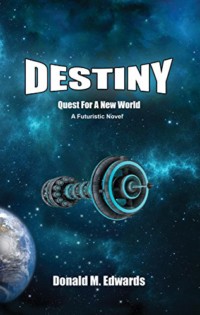Title: Destiny: A Quest for a New World
Author: Donald M. Edwards
Publisher: XlibrisUS
ISBN: 9781984531612
Pages: 255
Genre: Science-Fiction
Reviewed by: Megan Russell
Pacific Book Review
In the current social and political climate, science-fiction is not only an escape from reality — but an answer to it as well. Mae Jemison said it best with the quote, “I think science fiction helps us think about possibilities, to speculate – it helps us look at our society from a different perspective. It lets us look at our mores, using science as the backdrop, as the game changer.” Science-fiction is one of the most useful lenses in literature. Destiny: A Quest for a New World not only jumps into the deep end of the science-fiction genre, it provides a plot filled with complex questions about human nature answered in a remarkably transparent way.
Grant Wickham seems to live a remarkably ordinary life. However, only those who have been sworn to absolute secrecy know that Wickham is not just a simple corporate recruiter. His training with the US Navy made him the perfect candidate for a spy on the inside of the private sector. On track to become a full partner at his firm it seems as if Wickham has settled comfortably into his new corporate life. That is until 500 new thousand-dollar bills, a first class ticket on a supersonic flight to Geneva, Switzerland, and a note containing a request for his presence at ‘a top secret meeting’ is mysteriously delivered to his apartment in New York City. Wickham has been selected to spearhead a top secret mission to colonize space, and it is up to him to put together a team.
Author Donald M. Edwards seems to have done something quite astonishing with the science-fiction genre. His ability to divide the reader’s time between action and introspection is remarkable. The reader is never left behind in weird sci-fi jargon. The plot holds its suspense while maintaining clarity; an intricate balance which was pulled off successfully. My favorite part? The flashback scene between Alex and Grant in which their other-worldly glory days during college are beautifully described between details of sandy beaches and first-love expectations.
Dialogue seems to drive the exposition of this novel which is a double-edged sword. On the one hand, the action of the book never falters or slows in speed. On the other, it leaves me yearning for a little more description in the text. In fact, the first bit of description I could discern was of Alex, the protagonist’s love interests. With her “shapely breasts,” I felt as if the writing was resting on specific tropes that come with writing about women and romance. However, I appreciated the female presence and looked forward to other feminine dialogue throughout the piece.
The human condition and science-fiction are not only merged in this novel, they become almost inseparable. Edwards puts forth a refreshing spin on the genre and works tirelessly against the trap of falling into the sci-fi buzz-word abyss of imaginary nomenclature.


